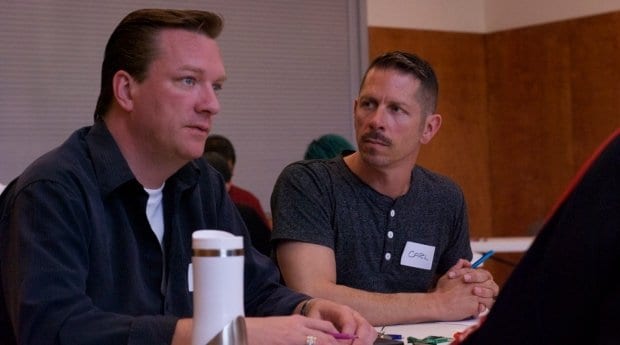The search for a name that fits continued May 25 as a group of invited friends sacrificed a Sunday afternoon to discuss the terms they use to describe themselves and our community.
After a short hiatus, the group of five friends originally convened by Xtra columnist Kevin Dale McKeown expanded to 20 and met at the Mount Pleasant Community Centre to consider the words used by the LGBT community and whether that many letters together constitute a community at all.
Once again, the room was filled primarily with people over the age of 40.
McKeown recapped his original impetus for the discussion. He first considered the question last Pride, he said, when some of his friends felt excluded by the term “queer.” The community didn’t always call itself “queer,” he noted. “In the beginning, there were faggots and dykes.” At some point the word “gay” emerged, then some lesbians sought a less male-centric term to describe the community, he said.
McKeown invited each table of participants to discuss four questions among themselves, then report back to the group: how do you describe yourself; how do you relate as “community” to others; are you part of our “gay” community and does it matter; and do any of those terms make you feel more (or less) included?
Carl Meadows wondered whether we should identify ourselves as anything. Anthony Stonechild quickly underlined the importance of self-identifying. “I’m a gay native man,” he said. “That’s where my start point is.”
Ron Rosell said it’s important to differentiate between the labels others place on us and the labels we take for ourselves.
Alan Herbert suggested that naming the community is an essential first step to developing its infrastructure, such as a new community centre. “I need a name,” he said, adding that for him that name is “gay.”
Paul Therien, founder of the Q Hall of Fame, agreed that names are important to build shared infrastructure and honour our pioneers. He said he struggled to name the Q Hall of Fame. “Nobody across Canada has the answers,” he said. “Nobody can definitively say we are the gay community.”
Eventually, the tables retired to discuss McKeown’s questions. When it was time to report back, Stonechild shared that only two people at his four-person table use the word “queer.”
“For the rest, it goes all over the place. We aren’t just one thing,” he said. “We are artists and activists, a high-heeled boy,” a two-spirited man and a Filipino-Canadian.
Stonechild said the people at his table liked “queer” or “q” as an overall, inclusive umbrella term but also felt connected to the gay community, in part because they came out in it.
Jen Sung said her table answered the questions through a lens of coming together in safety and in celebration.
Sitting at Sung’s table were two gay men and a straight man raised in the traditions of the queer community and now dating a queer woman. As for her own prevalent identity, Sung said it shifts to adapt to the spaces she’s in. In a room full of white people, Sung said, she might identify first as a woman of colour. In a lesbian space, she might emphasize that she’s a queer woman of colour.
Categories don’t always need to be strict, she suggested. They might be adaptable to space and time while still looking to others for commonality and solidarity.
Rosell reported that no one at his table liked the word “queer.” Though they understood the term’s reclamation from its derogatory history, many still found it controversial, he said. Where, then, does the fabric of our community weave together? he asked. And where are there separate threads?
We clearly share common causes, such as the pursuit of civil rights, Rosell said, suggesting that the term “rainbow” might best describe our community: a collection of different colours and distinct sub-groups that come together for a common purpose.
Meadows said his table also came up with a rainbow motif to communicate community. It’s important to name ourselves as “a proclamation to prevent invisibility,” he said. But no one at his table liked the word “queer,” either.
We are a community, Meadows stressed. But if we use the wrong word, some people won’t relate. Still, he urged people to “opt in” to community.
Reg Manning suggested that a new community centre could be named after a local community hero, though he wasn’t opposed to the rainbow, either.
Antonette Rea suggested that a visual of a rainbow could replace the written word to instantly convey community.
Meadows suggested decorating a new centre with a “beautiful mosaic” of all the terms community members use to describe themselves and their connection to each other.
Chief Al Houston had a simpler suggestion: “My community centre.”
Readers are invited to join the discussion when Xtra hosts a community town hall Wednesday, June 18 at 6:30pm at the Fountainhead Pub. For anyone unable to attend in person, the town hall will be streamed live on dailyxtra.com, and viewers will be encouraged to ask questions and share their comments.
Read McKeown’s columns and more on this topic:
Questioning the use of ‘queer’
Is ‘queer’ really the best we can do?
Use of ‘queer’ split largely by age in Vancouver
Use of ‘queer’ varies across Canada
Who’s Queer Now: An Xtra town hall on identity
Wed, June 18, 6:30–8pm
The Fountainhead Pub, 1025 Davie St
Can’t make it in person? Watch and participate in the town hall live on dailyxtra.com

 Why you can trust Xtra
Why you can trust Xtra


